The rise of ESG – the effect of the 2021 Shell case on global companies
The Shell Case casts a spotlight on the realities and impacts linked to the rise of ESG values in the corporate world.
[1] Background
On May 26, 2021, the District Court in The Hague delivered its ruling in the climate change case filed against Royal Dutch Shell plc (“Shell”) by a group of NGOs and private individuals.
These applicants asked for several orders: –
[1]. they asked the court to rule that Shell’s yearly volume of carbon dioxide (CO2) emissions was unlawful and must be reduced; and
[2]. a declaration and an injunctive order (an order that requires a party to do, or stops from doing something) that Shell reduces the net CO2 emissions of the Shell group, including the energy products sold, by 2030 (as compared to 2019) by 45%, 35% or 25%.
Note: “Net CO2 emissions” means the emissions from Shell and from the fuels and other energy products we sell to our customers, lowered by the emissions that are captured and stored or balanced with offsets, such as planting trees and protecting nature.
While the court found that Shell is not currently acting unlawfully, it ruled that Shell must reduce the CO2 emissions of Shell group operations and energy-carrying products sold by 45% (net) by the end of 2030 compared to its emissions in 2019.
[2] What legal basis is there for the Dutch Court to make this ruling over Shell?
The Dutch court has jurisdiction over Shell because it is headquartered and its principal place of business is in the Netherlands.
The court based its findings on an unwritten law called ‘duty of care’.
Under Dutch law, the court said, Shell had an ‘implicit responsibility’ to ‘prevent harm’.
The court also regarded climate change as a human rights issue.
The court stated that it is universally accepted that all businesses must respect human rights.
Each business must check whether its business activities cause any actual, or potential negative impacts, on human rights.
This can be caused by their own activities or in their business relationship with other businesses in the supply chain.
The common supply chain begins with the sourcing of raw materials.
The raw materials are then taken by a logistics provider to a supplier, which acts as the wholesaler.
The materials are taken to a manufacturer that processes them into finished products.
The product then goes to a distributor that wholesales the finished product, which is next delivered to a retailer.
The retailer sells the product in a store to consumers.
Once the consumer buys it, this completes the cycle.
Hence, all businesses involved in the supply chain cycle have a duty to adhere to human rights policies.
The court said that the consequences of climate change in the Netherlands and the Wadden region (islands and a body of water near the North Sea) pose a threat to the human rights of Dutch residents and the inhabitants of the Wadden region.
[3] What are the broader consequences of this order, globally and for other companies and potentially in other jurisdictions?
The impact of this order is massive.
For the first time the ‘duty of care’ or similar obligations of a (globally operating) company has been interpreted to include human rights impact of climate change and more generally, the ‘soft law’ implications of global international treaties like the Paris Agreement.
The court demanded that a global company like Shell fulfill its obligations under the Paris Climate Agreement, which is a legally binding international treaty on climate change, even though Shell was not a party to that agreement.
This includes other soft law ‘rules’ such as the ILO core labour standards, which is a set of four fundamental, universal and indivisible human rights: –
[1]. Freedom from forced labour;
[2]. Freedom from child labour;
[3]. Freedom from discrimination at work; and
[4]. Freedom to form and join a union, and to bargain collectively.
Other soft law ‘rules’ include: –
[1]. the UN Guiding Principles for Business and Human rights (which is a set of guidelines for States and companies to prevent, address and remedy human rights abuses committed in business operations; and
[2]. the OECD Guidelines which is a set of standards for responsible business conduct across a range of issues such as human rights, labour rights, and the environment for multinational companies.
These ‘rules’ define a company’s responsibilities which are independent of what states (have to) do.
Similar cases will probably follow soon, not just in The Netherlands but across the world.
Investors will also be affected, first as shareholders and lenders to these companies and second because what applies to companies will also apply to institutional investors.
Looking at the ripple effects of these outcomes, global standards might no longer be optional for companies.
Therefore, investors should take precautions by considering these factors before deciding to invest in a company.





